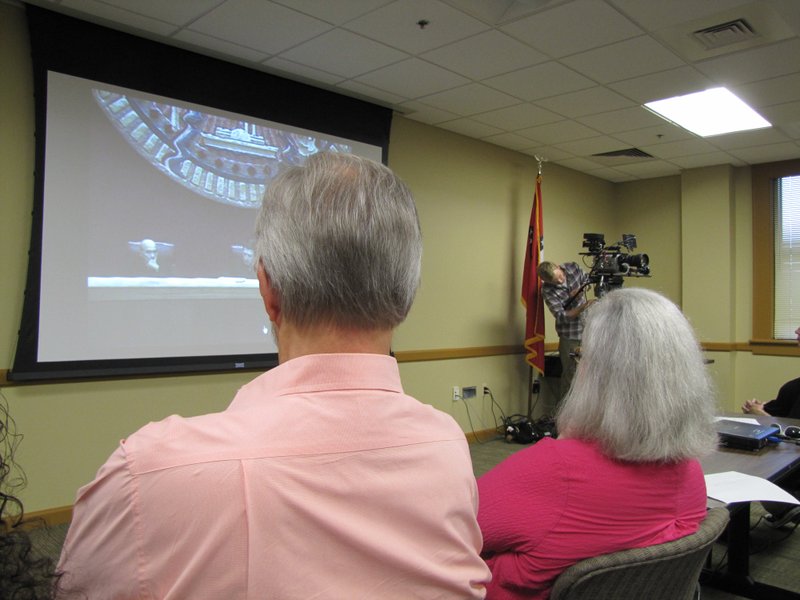LITTLE ROCK — Oral arguments in the Damien Echols appeal before the Arkansas Supreme Court concluded Thursday morning with supporters who believe he was wrongly convicted afterward expressing optimism about the outcome.
Echols, along with Jason Baldwin and Jessie Misskelley, was convicted of the 1993 slayings of three 8-year-old boys who were found dead and hog-tied in a ditch off Interstate 40 in West Memphis. Baldwin and Misskelley were sentenced to life in prison and are also seeking new trials.
Dennis Riordan, Echols' attorney who argued before the court, said new DNA evidence justifies a new trial or at least an evidentiary hearing to consider one.
Afterward, Riordan said he is confident Echols would be acquitted in a new proceeding, though he declined to speculate on whether the Arkansas Supreme Court will grant it. He called the hourlong session Thursday a "full and fair hearing."
"Let's see what the court has to say," he said of a new trial as he walked out. "But we do believe that sooner or later we're going to get there."
Echols' wife, Lorri Davis, said she wouldn't venture a guess as to how the court will rule, but that the hearing seemed "positive."
"It seems they're considering it and they're interested in justice and the law, which is important," she said, adding she will tell her husband to "get ready because I think we're getting ready to move quickly."
The convictions in the case came after Misskelley admitted the crime to police, but he later recanted and supporters of the men contend it was a false confession. Attorneys argue MIsskelley was mentally deficient, had initially denied the crime before changing his story and gave police information contradicting evidence in the case.
Misskelley was convicted first, followed by Echols and Baldwin, who were tried together.
David Raupp with the Arkansas Attorney General's office argued against a hearing or new trial, saying the DNA evidence was "unremarkable" and inconclusive in proving Echols' innocence. He said it did not outweigh statements Echols purportedly made implicating himself in the crime.
Echols' attorneys contend items tested for DNA from the scene failed to link Echols, Baldwin or Misskelley to the crime.
Riordan said the state's interpretation of the DNA statute allowing such challenges is flawed in that the state believes DNA evidence is never enough to overturn a conviction, but it also won't allow other evidence supporting innocence to be considered.
"Obviously, since my client is sentenced to death, the resolution of this case is of paramount importance to him," Riordan said. "But the interests at stake here are far broader than those of Mr. Echols or for that matter Mr. Baldin and Mr. Misskelley, his codefendants."
Riordan said the statute allows for all new evidence to be included in a new trial, and noted the defense would "welcome the opportunity" to show how Misskelley's confession can be refuted by physical evidence.
Raupp disagreed with the contention that evidence beyond DNA be allowed, telling Special Justice Jeff Priebe it would "harm the criminal justice system's interest in finality."
The court is expected to take two to three weeks before releasing its decision.
According to a March 24, 2009 legal brief by Echols' attorneys in support of the new trial, a sworn affidavit details how the jury foreman was aware of Misskelley's confession and said he would "place his knowledge of that forbidden matter before other jurors in an attempt to ensure Echols's conviction."
The brief also states that hair found on the bindings used on victim Michael Moore possibly matched Terry Hobbs, the stepfather of victim Steven Branch. A hair found near the crime scene, meanwhile, matched Hobbs' friend David Jacoby, the brief says.
Among those in attendance for the hearing was John Mark Byers, the father of victim Christopher Byers. Byers, who now believes Echols, Baldwin and Misskelley are innocent, wore bumper stickers supporting that view on the inside of his jacket, complying with a courtroom rule that prohibited such signs during the session.
He opened the jacket and revealed them shortly after he left the courtroom.
"The West Memphis three are innocent as can be," he said, referencing a nickname given to Echols, Baldwin and Misskelley by supporters, "and Terry Hobbs is guilty as sin."
The case has drawn international attention with frequent challenges and efforts organized by groups who believe Echols, Baldwin and Misskelley were wrongfully convicted. The attorneys argued in front of a packed courtroom and an overflow room where live video was shown filled up with more than 100 other spectators.
The group Arkansas Take Action earlier this month organized a concert in Little Rock to draw attention to Echols' appeal. Among those performing and speaking out against the conviction were actor Johnny Depp, Pearl Jam lead singer Eddie Vedder and Dixie Chicks singer Natalie Maines.
This story was originally published at 7:58 a.m.

